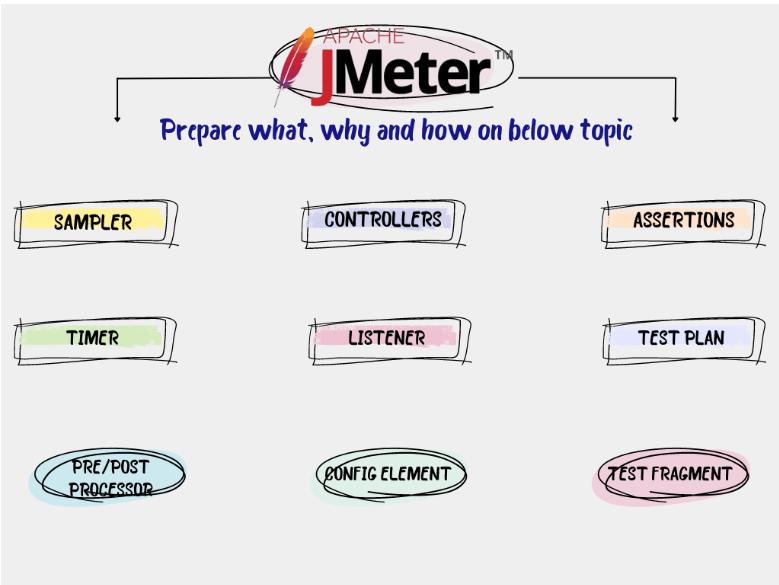Are you Preparing for a JMeter interview and want to stand out from the crowd? As an experienced professional, you definitely need to get ready to answer a variety of tough questions that best outline your in-depth knowledge of performance testing with the aid of JMeter. This article addresses some of the most often asked JMeter interview questions for seasoned specialists to get ready effectively and confidently.
What is JMeter and what are its primary uses?
Answer: JMeter is an open-source tool designed for performance testing and functional testing of web applications. testers apply this method to simulate a heavy load on servers, networks, or other objects to test their strength and analyze overall performance under different load types. This tool is crucial for performance testing with JMeter, providing insights into system behavior under various conditions.
Can you explain the different types of performance testing that can be done using JMeter?
JMeter supports various types of performance testing, including:
- Load Testing: Load testing measures system performance under expected user loads.
- Stress Testing: Stress testing determines system robustness by testing beyond normal operational capacity.
- Spike Testing: Observes system performance when load increases suddenly.
- Endurance Testing: Evaluates system stability over an extended period. These testing types ensure comprehensive performance testing with JMeter.
What are JMeter Plugins and how do you install them?
JMeter plugins are add-ons that extend JMeter’s functionality, offering additional samplers, listeners, and other components. To install JMeter plugins, use the JMeter Plugins Manager:
- Open JMeter.
- Go to Options -> Plugins Manager.
- In the Plugins Manager, select the desired plugins and click the ‘Apply Changes and Restart JMeter’ button. This process answers the common query on how to install JMeter plugins effectively.
How does Distributed Testing in JMeter work?
Distributed testing in JMeter involves using multiple machines to generate load on a server. It helps to create a higher load than a single machine can handle. The master-slave setup in JMeter allows the master to control multiple slave machines, which execute the test plan. This approach is beneficial for large-scale performance testing with JMeter.
What are Listeners in JMeter and their significance?
Listeners in JMeter are components that collect and display results from test executions. They provide various ways to view test results, such as tables, graphs, and logs. Common listeners include View Results Tree, Summary Report, and Aggregate Report. Understanding listeners in JMeter is crucial for analyzing performance test results effectively.
What are some common JMeter Interview Questions for Experienced Professionals?
Some common JMeter interview questions for experienced professionals include:
- How do you handle dynamic data in JMeter?
- Explain the purpose and use of JMeter’s correlation and parameterization.
- Describe a challenging performance testing scenario you handled using JMeter.

What are JMeter’s key components and their functions?
JMeter’s key components include:
- Thread Group: Defines the number of threads and ramp-up period for testing.
- Samplers: Perform the actual requests (e.g., HTTP Request).
- Listeners: Collect and display results.
- Timers: Introduce delays between requests.
How do you handle correlation in JMeter?
Correlation in JMeter software involves capturing dynamic data from server responses and using it in subsequent requests. you can handle correlation by using a Regular Expression Extractor, JSON Extractor, or other Post-Processors. Handling correlation ensures that JMeter tests simulate real-world user interactions accurately.
Can you explain the purpose of Assertions in JMeter?
Assertions in JMeter are used to validate that the server response matches expected criteria. Common assertions include Response Assertion, Duration Assertion, and Size Assertion. These help ensure that the application under test behaves as expected under load.
How do you perform parameterization in JMeter?
Parameterization in JMeter involves using external data sources, such as CSV files, to provide input values for test scripts. This allows for testing with multiple data sets, enhancing the realism of performance testing. The CSV Data Set Config element is commonly used for this purpose.
What is the role of a Test Plan in JMeter?
A Test Plan in JMeter software is a container for all elements of a performance test, including thread groups, samplers, listeners, and other configurations. It defines the structure and flow of the test and ensures that all elements work together to simulate user behavior accurately.
Describe a scenario where you used Distributed Testing in JMeter.
In a recent project, we used distributed testing in JMeter to simulate a high load on a web application. By configuring a master machine to control multiple slave machines, we were able to generate thousands of concurrent users, providing valuable insights into the application’s performance and identifying potential bottlenecks.
What are some advanced JMeter interview questions and answers for experienced professionals?
Advanced questions include:
- How do you optimize JMeter scripts for better performance?
- What strategies do you use for analyzing performance test results in JMeter?
- How do you integrate JMeter with CI/CD pipelines?
How do you monitor server health during JMeter tests?
You can Monitor the server’s health during the JMeter tests with the help of tools like JMeter’s PerfMon Plugin, which collects server-side metrics such as CPU, memory, and disk usage. This helps in identifying performance issues related to server resources during load tests.
What challenges have you faced in performance testing with JMeter and how did you overcome them?
Common challenges include handling dynamic data, managing large-scale tests, and analyzing complex results. Solutions involve using JMeter plugins for advanced data handling, leveraging distributed testing for high loads, and using listeners and external tools for in-depth analysis.
Conclusion
Mastering JMeter performance testing can help advance your profession as a performance tester. This blog has discussed a number of important JMeter interview questions for experienced professionals. To be completely ready for your next interview, place emphasis on comprehending the fundamental principles and practice real-world circumstances.
Ready to optimize your software testing process with expert QA and performance testing services? Contact us at PrimeQA Solutions to leverage the power of JMeter and other advanced tools. Our experienced team is here to help you achieve seamless and efficient testing outcomes. Get in touch with us today to start your software testing journey!
FAQ
1. What is the use of Jmeter and how it helps in performance testing?
Jmeter is a free tool that is used for testing websites and checking how well can a website handle heavy loads. The main purpose of Jmeter is to check whether the server can handle a huge number of users at once or succumb to pressure.
2. How can the Jmeter plugin be helpful in testing and how to install it?
With the help of JMeter Plugin, you can add extra features to the tool, like it provides new ways to do new types of tests. To install the plugin you must first go to Options and then select Plugin Manager then pick the plugin of your choice and click Apply changes and restart Jmeter to install.
3. What is the meaning of Distributed Testing in Jmeter and how it is useful for testing?
With the help of distributed testing several computers can run tests which is quite handy as it helps to a much bigger load than a single computer can handle. This is quite helpful when the traffic is quite high. One main computer is connected to several other computers to check how well the system performs in such high traffic.
4. How is Jmeter used in changing data and define correlation?
Jmeter uses special tools that manage the data that changes and use the data for future requests. This entire process is known as correlation which makes sure that Jmeter is performing efficiently.
5. How can Jmeter scripts be run better and be used in CI/CD pipelines?
To make the Jmeter scripts run better one can simplify them by avoiding unnecessary optimizing and checks for the test settings. Jmeter can be used in CI/CD pipelines by using tools like Jenkins.







